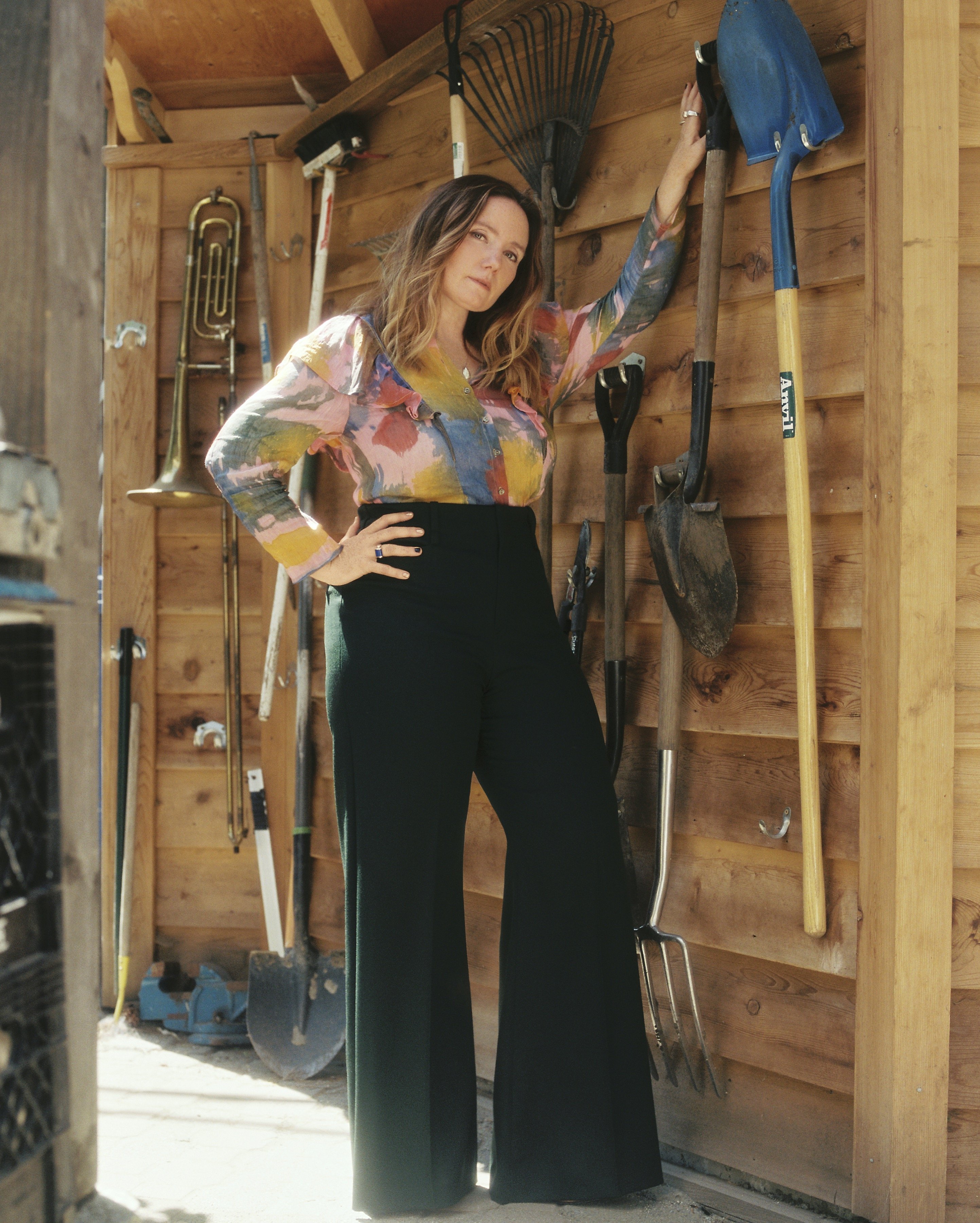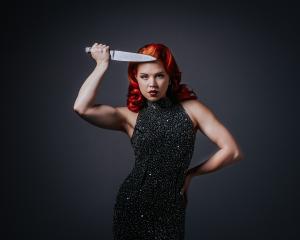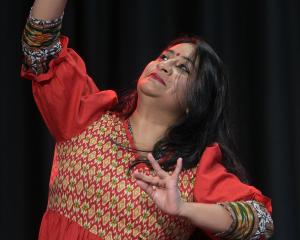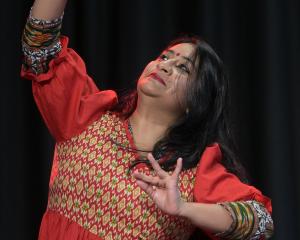
In the video for her song Done, Frazey Ford stands in front of the "soul" section of a record store and later looks pretty happy at having found some live Otis Redding on vinyl.
It’s not so surprising in the context of the southern soul of one of her best-loved songs, but maybe just a little for those more familiar with an earlier phase of the Canadian singer-songwriter’s career.
Because while these days Ford is three albums into a rich vein of form as a purveyor of roots-inflected Memphis soul, reach further back into her catalogue and you’re listening to the twanged folk of Americana trio the Be Good Tanyas, one of the breakout bands of the alt-country explosion of the ’90s and 2000s.
Back then it was banjo, fireside harmonies and backwoods melodies in songs such as Littlest Birds.
At the time, Ford seemed a perfect fit, with a voice that bore comparison with the likes of Iris DeMent and Emmylou Harris for its fragile power and acoustic authenticity.
Done and the 2014 album it graced, Indian Ocean, is a different sort of vibe. As are the songs on new album U Kin B The Sun, Ford’s third as a solo artist.
It’s the album she’s touring to Dunedin this month as part of the Dunedin Arts Festival, and once again it’s the sounds of Dusty Springfield, Marvin Gaye and Al Green she’s channelling.
U Kin B The Sun is an exercise in locked on grooves that kick in from the songs’ first beats and writhe right on through to the closing bars and beyond, melodic bass playing high in the mix.
"We co-wrote a lot of the album in the studio with the bass player, so that’s Darren Parris, and drummer Leon Power, and we were improvising a lot and those ended up becoming a lot of the songs on the album," Ford explains.
"We had been touring a lot together for the previous album and we were really synced up, so we decided to kind of start the song-writing process with the rhythm section very forward. Rather than the other way, which is how I usually do it."
Those studio improvisations had their own magic, so it was a matter of clicking into that energy rather than insisting they conformed to a traditional verse, chorus, verse straitjacket.
It was a new way of doing things, she says, but nevertheless built on the direction of Indian Ocean, on which Ford was backed by the storied Hi Rhythm Section, of Hi Records and Al Green fame.
While Parris and Power are laying down their undeniable rhythms on the latest album, Ford gets into her work, that familiar voice these days boldly unshackled, the perfect vehicle for the rootsy soul sounds she’s always loved.
Ford says the distance between the two strands of her recording career can be overstated, despite being filed in different sections of the record store.
"I think those types of music influence each other a lot more than people realise. You think of one side of it as more of a black music expression and one a bit more white, but these musics have really been influencing each other the whole time.
"But also, I grew up singing with my mom, who has a very traditional Cajun-country sound, but then there were a lot of soul records, Otis Redding, and I was really drawn to that as well. So it’s kind of, like, both I think were influencing me."
The harmonies of the Be Good Tanyas were a big part of the draw for her when the trio teamed up in the ’90s, the band members also sharing an interest in exploring music from the ’30s, even if different parts of that inheritance, she says.
"I was probably more interested in gospel ... and maybe Sam [Parton] was a little more traditional country."
But it all nestles together under the accommodatingly catch-all category "Americana".
"It is all very similar and it is all very honest, or from the heart, or real, it is all the expression and emotionality. It’s all, I guess, folk music," Ford says.
"There are so many crossovers within gospel, country, soul. People don’t realise that even what we think of as country music is actually very African influenced, with the banjo. And even early soul singing, it kind of goes back and forth, the influences."
In fact, when she was writing songs for the Be Good Tanyas she thought she was writing soul songs, Ford says.
"And, actually, a lot of those songs were in a previous band and they were played more as soul songs, and then we ended up, as the Be Good Tanyas, using them."
Recording with the Hi Rhythm Section helped clarify the permeable nature of those genre divisions for Ford.
"When we were doing the Indian Ocean album, at first in my mind I was ‘I have to write these soul songs’, or whatever. But eventually I just realised that whatever I brought to that band, that Al Green band, it was just about the feeling and they were going to respond to anything that has a lot of feeling. That’s just how they are approaching any of it really, the expression, regardless of the genre really.
"And I think even though you wouldn’t maybe recognise it, even the way we arranged a lot of the Be Good Tanyas stuff was sort of influenced by the type of arrangement you would find on an Al Green album, the way they approached the space."
Like a lot of music from the past couple of years, U Kin B The Sun was caught up in and becalmed by Covid. It was released to strong reviews in 2020 and made several albums of the year lists that year. But then the pandemic shut things down and tours were cancelled, then rescheduled and cancelled again.
Ford’s pleased to be finally on the road and sharing it.
"I don’t think an album feels complete until you have performed it and then it settles."
It completes the spiritual artistic process, she says, in which you are quite inward for a couple of years then turn to face the world with what you’ve created.
"It is almost like the meaning comes to you at that point when people are interacting with it. So it was a bit weird. A bit like a suspended-in-time art project."
And these songs, particularly, feel like they need to be played and expressed. Not just because those bass lines were built to move bodies but also because there’s some real emotion here to unleash. Among them, anger.
"I would say that anger is a really undervalued emotion in our society generally," Ford says. "Particularly for women. People tend to think of anger ... they’re scared of it, they don’t value it in the same way they maybe value sadness or happiness.
"So people are quite dismissive or repressed about their anger, but anger - especially if you have had any trauma or any abuse - it is a real vehicle to understand your deepest nervous system and why you were cross."
Ford exhibits a good bit of understanding, then, on U Kin B The Sun, including about some less than ideal relationships.
"I see that you’re with him, I see that you’re with him/And lying," she sings on Purple and Brown.
Then there’s the song titled Mother******. It’s the only track on the album for which she alone has the writing credit, the credit for the other songs is mostly shared with Parris and Power.
"For me, I survived a lot of trauma and once I was able to make space and respect the kind of rage I felt in my body from the trespasses of my childhood, I was able to really feel like a whole person. I think that’s what I am talking about," she says.
Ford’s was a difficult childhood, her parents struggling to settle in Canada after fleeing the US to avoid the Vietnam draft.
"It is not like anger in regards of hurting anybody," she clarifies, "it is just being able to make space to feel a thing that’s difficult but, like any other thing, it’s like holding space for a big part of yourself to let it resolve and change."
One thing about women not being able to feel their anger is that they are removed from their bodies, in a way, Ford says. This album is a lot more embodied, she says, because she was able to access those emotions and do a lot of healing.
It’s not all about the forensics of relationships, on The Kids Are Having None Of It — one of the album tracks that’s been released with a video — Ford takes a swipe at the malign forces afoot in the world, those who would use hate as a pathway to power.
"All you deal is fear, the easy way to steal," she sings.
In the video, a neighbourhood’s young people hold up signs supporting trans rights, women’s rights and decolonisation, while calling out the pointless tokenism of metal straws while the climate crisis is allowed to deepened unaddressed.
Beyond vocal duties, Ford plays guitar, keyboards and grand piano on the latest album, which also influenced the shape and sound of the songs.
"I wrote a lot of the album on piano. I think it really affected my interaction with the rhythm section in different ways. There’s a different energy when you are playing piano."
There’s a grand at Knox Church, her venue for the Dunedin gig, but she sounds less than certain about lifting its lid on the night. She usually sticks to the keyboards when playing live. But neither does she rule it out.
Whichever it turns out to be, it seems sure to be played with heart and soul. Certainly more soul than twang. And she says her fans get that. It’s rare if ever for people to turn up to her gigs now in chequered shirts expecting the greatest hits of the Be Good Tanyas.
"No, almost never. I think a lot of people who know me don’t even know about the Be Good Tanyas," she says.
"But I have been thinking about pulling out some old tracks. Because the Be Good Tanyas is a huge part of who I am too. I am not throwing that era out, it was just time to do other stuff."
The gig
Frazey Ford plays Knox Church, Dunedin, as part of the Dunedin Arts Festival, October 13, 8pm












